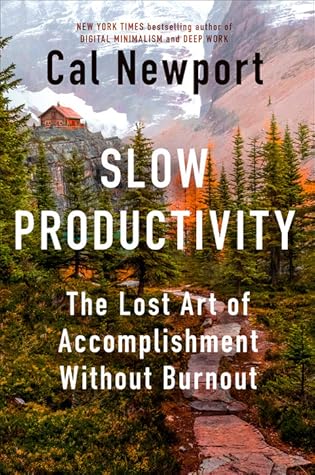More on this book
Community
Kindle Notes & Highlights
by
Cal Newport
Started reading
December 11, 2024
SLOW PRODUCTIVITY A philosophy for organizing knowledge work efforts in a sustainable and meaningful manner, based on the following three principles: 1. Do fewer things. 2. Work at a natural pace. 3. Obsess over quality.
this philosophy rejects busyness, seeing overload as an obstacle to producing results that matter, not a badge of pride. It also posits that professional efforts should unfold at a more varied and humane pace, with hard periods counterbalanced by relaxation at many different timescales, and that a focus on impressive quality, not performative activity, should underpin everything.
As the twentieth century progressed, this visible-activity heuristic became the dominant way we began thinking about productivity in knowledge work.
PSEUDO-PRODUCTIVITY The use of visible activity as the primary means of approximating actual productive effort.
KNOWLEDGE WORK (GENERAL DEFINITION) The economic activity in which knowledge is transformed into an artifact with market value through the application of cognitive effort.
The second part of this book is dedicated to elaborating a philosophy of slow productivity—an alternative framework knowledge workers can use to organize and execute tasks that sidesteps the hurry and ever-expanding workloads generated by pseudo-productivity.
SLOW PRODUCTIVITY A philosophy for organizing knowledge work efforts in a sustainable and meaningful manner, based on the following three principles: 1. Do fewer things. 2. Work at a natural pace. 3. Obsess over quality.
it’s undeniable that it represents a failure of Feynman’s best-laid plans to avoid extraneous projects in his professional life. “Irresponsibility requires eternal vigilance,” Feynman told the Los Angeles Times in a 1986 profile. “And I failed! I wasn’t careful enough when this presidential commission thing came up.


